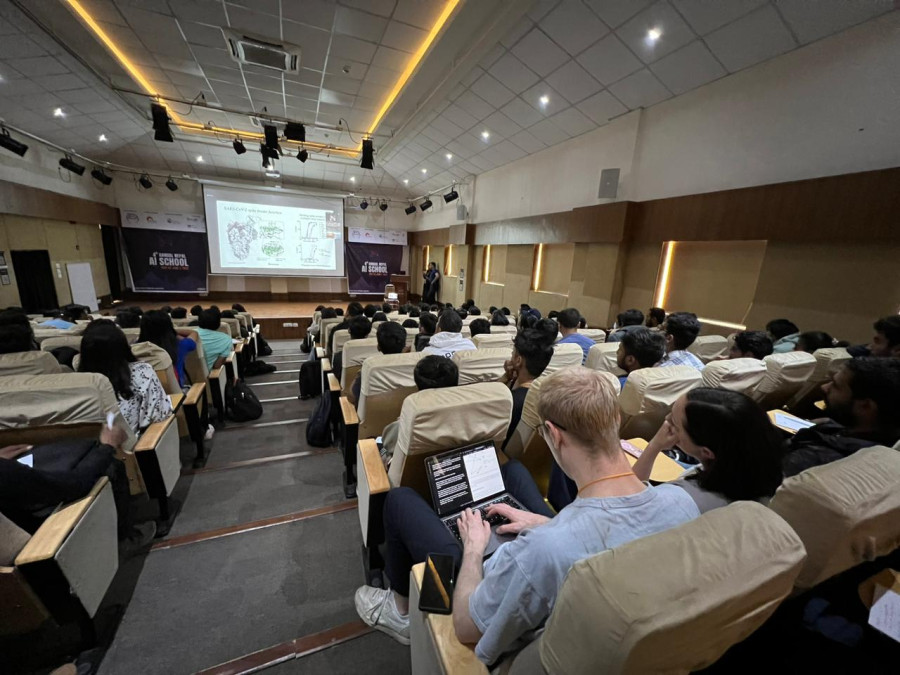Culture & Lifestyle
‘Artificial intelligence school’ finds momentum in Kathmandu
The 11-day event hopes to ensure that knowledge and resource surrounding AI are accessible to students and professionals in Nepal.
Rose Singh
Artificial intelligence (AI) has been developing rapidly—exciting some while worrying others. Nepal Applied Mathematics and Informatics Institute for Research (NAAMII), a scientific research organisation, is conducting its fourth annual Nepal ‘Artificial intelligence school’ to ensure that knowledge and resource surrounding AI are accessible to students and professionals in Nepal. The event started on May 22 and will continue till June 1.
“There is a lot of talent in Nepal who require an interactive environment to develop their skills instead of leaving for abroad,” says Prasuma Rawal, partnership, growth and outreach manager at NAAMII.
NAAMII’s area of focus is divided into three niches—academic, research, and industrial. The academic department is responsible for conducting this 11-day-long AI school. With 150 participants and 26 speakers, the event brings students from universities across Nepal along with a delegation from the United Kingdom.
Prakash Poudyal, assistant professor at Kathmandu University School of Engineering, says the current domain of AI in Nepal requires professionally updated knowledge.
Although AI is not a new concept for Nepal, its adoption is largely limited to private spheres, creating a dent in governmental areas. “The government’s data, if released, can help make AI more efficient and reduce a significant workload,” adds Poudyal.
According to him, as AI continues to expand its reach globally, the necessity for extensive research and adoption of its modules becomes imperative. “An opportunity such as this is great for students to understand the developments taking place outside and work towards it,” said Ashutosh Modi, keynote speaker from IIT Kanpur.
Along with the lecture series, the event also provides business knowledge to participants to expand their ventures. NAAMII, along with Diyo.AI, also provides lab sessions for participants under its project ‘Hackathon.’ By embedding participants with practical knowledge, the organisation seeks to support innovation, generate revenue and provide funds for the ideation of innovative projects.
The primary objective behind conducting an event like this is to institutionalise the process of research and development that is extremely necessary to flourish innovation. “It is necessary for even government members, experts of different fields, academicians, and legal professionals to participate and learn the changes happening around them,” says Poudyal.
Conducting science and technology research in low-income nations like Nepal becomes an additional challenge due to insufficient funding, a lack of experts in various fields, and a lack of infrastructure and policy. This doesn’t mean that the impact such innovation would have on low-middle-income countries isn’t substantial–both economically and technologically.
Via its ‘Hackathon’ program, the organisation is also trying to adapt participants to the current landscape and provide venture development for startups. “Government funding isn’t significant in promoting an ecosystem required by start-ups. There is a necessity to move away from donor mentality and enhance funding in R&D to grow the country,” says Kaushal Wagle, incubation manager at Kings College.
The current status of AI-related education in institutions across Nepal are heavily motivated to produce good scores in examination instead of looking at the subject as a learning arena. This has limited the education pedagogy of Nepal to rote learning more than it has fostered creativity.
“Such programs provide intuitive knowledge and familiarise us with complex ideas that we can then explore ourselves. Such information is hardly present in our course,” says Shuvangi Adhikari, a third-year student at IOE, Pulchowk.
AI doesn’t only affect people involved in the technical fields, but rather it will affect every person. The paradigm shift in the reach of technology means everyone needs to understand its impact. This can make one question the utility of the current education system. “It is no doubt that the education system across the world needs to be revamped,” adds Modi.
Currently, there aren’t many organisations that are involved in such programs. AI-related skills and education are limited to private organisations that provide such knowledge to their employees for skills enhancement. The general population doesn’t quickly get to access such opportunities. Therefore, initiatives such as these break apart from the gate-keeping mentality to seek to disseminate information to all.
“The courses in AI need to be updated in universities, and such programs help all professionals understand the current worldwide trend and quickly get on the innovation wagon,” says Poudyal.




 8.65°C Kathmandu
8.65°C Kathmandu















